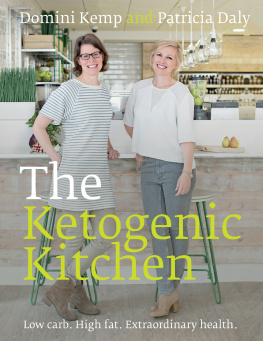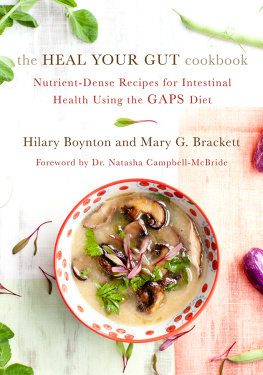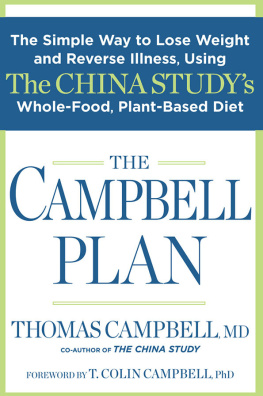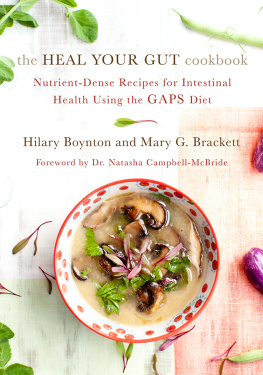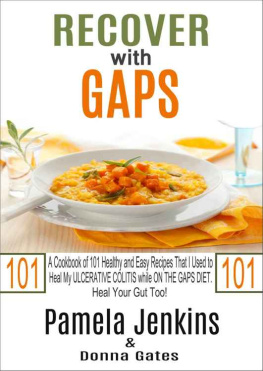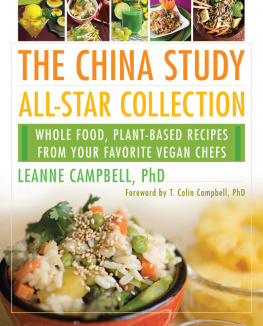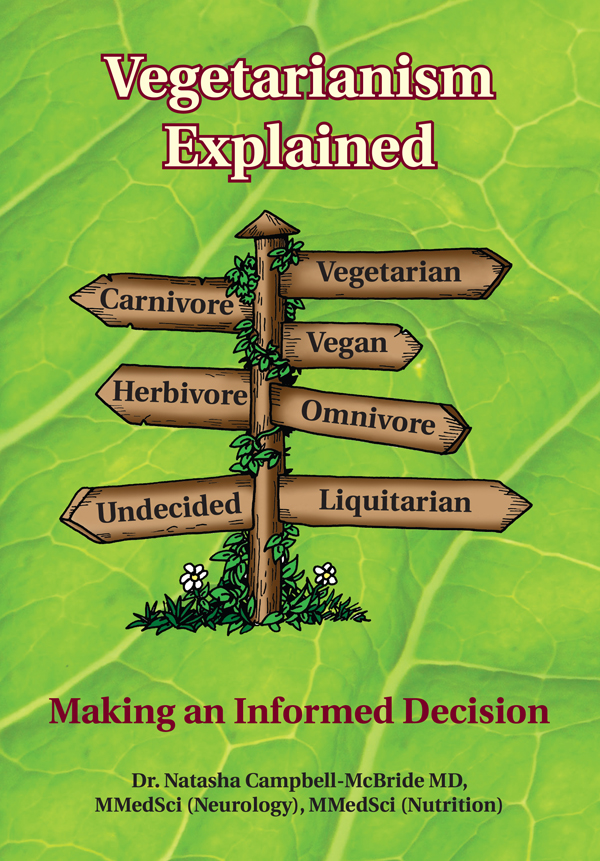Contents
Guide
Pagebreaks of the print version
Vegetarianism Explained
Dr. Natasha Campbell-McBride MD, MMedSci (neurology), MMedSci (nutrition)
Natasha Campbell-McBride, 2017
Vegetarianism Explained
ISBN 13: 978-0-9548520-6-1
First printed 2017
The right of Dr. Natasha Campbell-McBride to be identified as the author of this work has been asserted by her in accordance with the Copyright, Patent and Designs Act 1988.
All rights reserved. No part of this work may be reproduced, stored in a retrieval system, or transmitted in any form or by any means without prior written permission of the author.
Cover photography and design by Nicholas Campbell-McBride
Illustrations by Peter Kent
Printed by Halstan & Co. Ltd., Amersham, Buckinghamshire
Reviews
Dr Campbell-McBride has done it again. Her first book Gut and Psychology Syndrome created a small revolution in the field of Integrative Medicine. She brought forgotten cultural knowledge to the world of nutrition and the application of the content has helped tens or hundreds of thousands of autistic children to recover or improve, where all other interventions had failed.
In this well-referenced work she dares to bring even more of her common sense to the nutritional field. While we, physicians, are bombarded with one diet fad after another, pretty much every one of my patients is confused should they be on the high protein or ketogenic diet, juicing only, high fat, no fat, vegan, raw food only, follow the China study, etc.etc. Whose advice should they follow?
As a young man I became aware that a truthful, intelligent discussion about diet in public is not welcomed. I was touched that Dr Campbell-McBrides book starts with a case related to the same issue. She brings her intelligence and uncorrupted common sense to the table and re-introduces us to the middle path of nutrition. Her recommendations are based on the observed and published truth, are easy to follow and surely will lead to greater levels of health for everyone willing to replace their belief with what actually works. Its not just a must-read but also a must follow!
Dr Dietrich Klinghardt, MD PhD
Since 1970 the percentage of all wildlife has reduced by an average of 57%. Theyre gone! Hummingbirds, elephants, rainbow trout, polar bears, honey bees, gone. There is a mass extinction occurring that is destroying the natural world upon which humanity depends.
And the same dynamic is occurring with humans. For the first time in the history of the human species our offspring are in danger of having shorter life spans than their parents. They will get sick at earlier ages, get diagnosed with diseases at earlier ages, and die at earlier ages than the age their parents die at. We have to wake up! Were doing something terribly wrong!
There is a danger in our midst today. We see it in every aspect of our lives. Fanaticism (displaying very strict standards and little tolerance for contrary ideas or opinions) is permeating our governments, our spiritual and religious beliefs, and how we take care of our bodies. There is fanaticism about food, which so many people have today, that is not based on solid science.
Vegetarianism Explained is a rational, science-based, common-sense explanation of how our bodies use food, that will allow all of us healthy people, sick people, parents raising children - to understand the role of our food choices, what different foods do in our bodies and what our bodies need. This book should be required reading for every teenager, every parent, and every person fighting an illness!
Thank you, Dr Campbell-McBride, youve produced another critical masterpiece of health guidance for us all!
Dr Tom OBryan, DC CCN DACBN
Dr Natasha Campbell-McBride has done it again! As in her previous publications, she shone clear light where there is much misunderstanding and misinformation about nutrition and health. In this concise and cogent book she has not only explored and debunked the myths behind the putative health benefits of purely plant based diets, such as veganism and vegetarianism, but also addressed the misconception that any food, that is not animal food, is healthy. Her masterly blending of clinical cases, extensive review of the literature, and voice of personal experience make for compelling reading.
Dr Shideh Pouria, MB BS BSc MRCP (UK) PhD
Finally, a world class human digestion expert with a success resume as long as my arm explains why eating animals is positive for human health! The current diatribe against animal agriculture and meat consumption needs to tangle with a formidable foe: the human gut. As Dr Natasha Campbell-McBride dissects human digestion and its relationship to animals, the accusations that grass-fed livestock is destroying the planet are clearly disproven. Anyone who thinks the anti-livestock crowd is simply fighting for planetary peace and longevity will understand, after reading this book, that the fight is actually against the human gut. Id like to take care of mine, thank you very much, and this book explains how to do it.
Joel Salatin, Organic Farmer, Consultant and Author, Polyface Farm, Virginia, USA
Olshansky SJ, Passaro DJ, et al. A potential decline in life expectancy in the United States in the 21st century. N Engl J Med. 2005 Mar 17;352(11):1138-45
Contents
Few things are harder to put up with than the annoyance of a good example.
Mark Twain
Vegetarianism is not common in the majority of the worlds countries. Of the countries where statistics on vegetarianism (including veganism) are available, about half show less than 5% of the population. A few countries show 913% of the population: Austria, Australia, Israel, United Kingdom and Sweden. The remaining countries have lower numbers, apart from India, where almost 30% of the population are recorded as vegetarian. India is an exception and we will talk about it in more detail in this book. However, the number of vegetarians outside India is growing, due to active promotion of vegetarianism, particularly in Western countries.
Some people decide to become vegetarian after discovering how animals and birds are treated by industrial farming. Others decide to make such a profound change in their lifestyle for emotional, political or religious reasons. Many people decide to become vegetarian because they believe that they will lose weight. Reading the promotional materials, one gets an impression that vegetarianism is the right way to live your life, that it is good for your health, kind to animals and that it saves the planet. A lot of these materials are written with an air of righteousness and aim to make the reader ashamed of eating meat. On top of that, food and nutritional sciences produce an endless number of statements proposing that meat and other animal foods are the cause of all illnesses in the world.
It is very easy to get confused! And indeed, many people do get confused. Many parents today believe that if their child decides to become a vegetarian, they must be supportive. People regard vegetarians as setting a good example, while vegetarians view meat-eaters with the air of a pious person looking at a sinner. Are vegetarians a good example? What about vegans? Should we all become vegetarian or even vegan? Apart from pro-vegetarian propaganda there is very little scientific information available on the subject. Amongst the small number of studies that have been done, quite a few have not been conducted very well and attract professional criticism.
Thankfully, science does not have a monopoly on knowledge! Many doctors who work with vegetarian and vegan patients have accumulated valuable clinical experience. They dont need studies to tell them what effects this lifestyle can have on a person. In this book I would like to share my clinical experience and my conclusions with you, dear reader!


